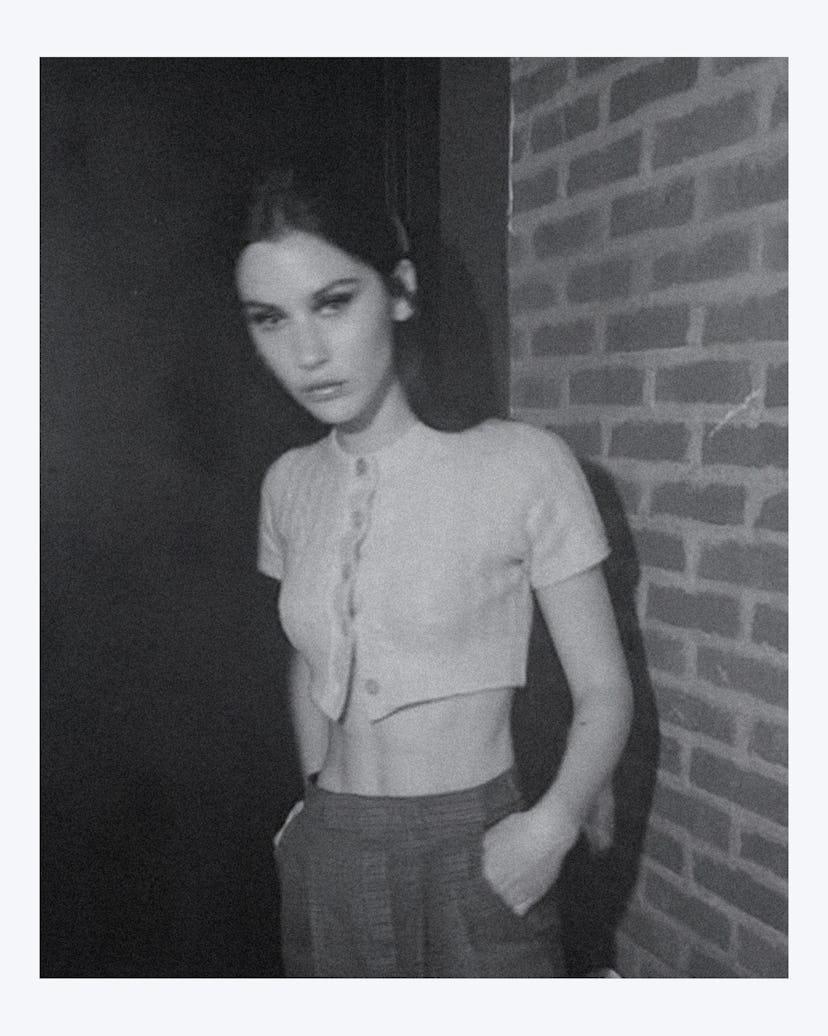Gracie Abrams Is Writing All of This Down

When Gracie Abrams was in third grade, her teacher assigned the class to keep a journal. Not for anyone to read; just to help the students write consistently. Abrams wrote in hers assiduously — until one day, she lost it. It was gone, poof.
She played drums at the time, so she sat down at her drum kit and wrote a song about losing her journal: her first song. “It was aggressive,” she said recently. “It was the feeling of expression in its purest form—like, I’d never want anyone to see this, but I felt better somehow.”
That’s to say that the specificity and diaristic intimacy with which Abrams, 22, writes songs is not new—but now, anyone can read what she’s written. During the pandemic she and her music got really, wildly famous. Her first EP, “Minor,” came out in July 2020; she released her second one, “This Is What It Feels Like,” in November 2021. In between, her Instagram follower count nearly doubled, and she went from playing Zoom shows (since live performances weren’t really a thing during that first pandemic summer) to playing her first-ever in-person show in September, in Santa Ana, California. And starting this April, she’ll be supporting the first leg of Olivia Rodrigo’s “Sour” tour. (They’re close friends; Rodrigo has credited “Minor” with helping to inspire her song “Drivers License.”)
Until then, Abrams is in the middle of a six-week-long headlining tour of her own, which started in February and included two sold-out stops in New York and in Los Angeles. Throughout, she’s been wearing pieces borrowed from Hedi Slimane’s Celine: a “dream suit” one night; a cropped sweater set with wool trousers the next; block-heel loafers. It feels “like I have a fairy godmother,” she said. When we spoke over video chat, she was in the SoHo apartment that she and her brother, a graphic designer, recently moved into together. “He’s so talented it’s insane,” she said, selecting one of the vinyl album covers he designed from a credenza to show me. “I really want to work with him one day.”
Abrams grew up in Los Angeles, in a Hollywood family—her dad is the director J.J. Abrams; he and her mom run the production company Bad Robot—and began posting song fragments and covers on Instagram as a teenager. The years she spent cultivating an audience online helped produce an intense Gracie fandom. (An example: A stranger once sent her one single cent on Venmo with the request that she release a new song. Her fans also include Phoebe Bridgers and Taylor Swift.) Before her live shows now, she often hosts an informal performance she calls sound checks—but they’re more like solo acoustic performances-slash-hangouts. “The way she treats her fans, weirdly, is the way she is as a friend,” said the songwriter Sarah Aarons, who met Abrams in 2019 and helped write songs on both EPs. “There’s no social media version of Gracie. I think that’s why her music sounds genuine. I think that’s why her fans feel a genuine connection.”
She attended Barnard College for a year, but took leave after her freshman year and returned to L.A. to pursue music. That was 2019. The following year, the world shut down. “The isolation definitely forced some kind of self-confrontation that was too much for me at first,” Abrams said. “Everything was under a microscope all of the sudden, and there were fewer places to escape to.” When I asked her what she needed to confront those emotions, she looked to the side of her computer’s camera. All the isolation, she explained, made her take a closer look at “a lot of stuff from years before.” All the alone time and forced introspection meant those things were harder to just sweep under the rug. She re-entered therapy at the end of 2020, which helped her process the events of her past. “I had enough of a grasp on myself as a person to advocate for myself,” she said. “I feel like that’s a very common thing that a lot of people experience growing up—a lot of young women especially.”
For about a year and a half, she wasn’t writing very much. But last summer, Abrams went to Camden, Maine, where her mom’s side of the family is from—and there, she started to feel the writing come loose. She drove to upstate New York to work with Aaron Dessner, the producer and member of The National, at his Long Pond studio. She described the songs they made—and continue to make; Abrams has started writing for her debut album—as a kind of “time capsule,” she said. “I’m writing about stuff that is so, like a diary that is also for everybody to see. Growing up is weird.”
As she immortalizes the past in her songs, she said she’s also opening herself up to the new opportunities her career has presented her with: to travel and play music in bigger rooms in front of more people. “As long as they will have me, I will be writing,” she said. “And if they, one day, will not have me, I will be writing.”